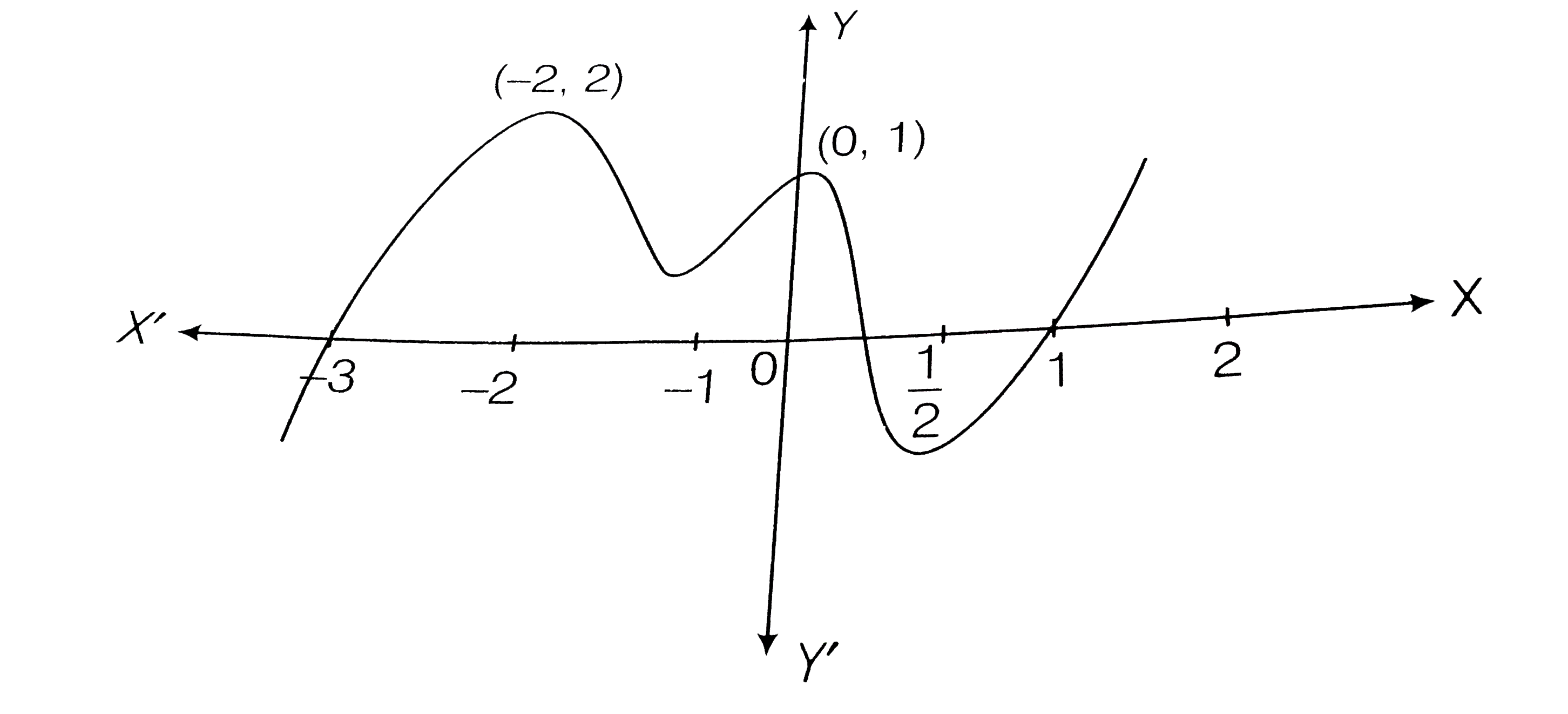Given P(x) =x4+ax3+bx2+cx+d such that x=0 is the only real root of P'(x) =0 . If P(-1) lt P(1),then∈the∫erval[-1,1]
P(-1) is the minimum and p(1)the maximum of P
(-1) is not minimum but p(1) the maximum of P
p(-1) is the minimum but P(1) is not the maximum of P
Niether p(-1) is the maxiumum nor P(1) is the maximum of P
The correct Answer is:B
We have
p(x)=x4+ax3+bx2+cx+d
⇒P'(x)=4x3+3ax2+2bx+c
It is gien that x=0 is a root of p'(x)=0
∴P'(0)=0⇒c=0
Putting c=0 , we get
P'(x)=x(4x2+3ax+2b)
Since x=0 is only real root of P'(x)=0. Therefore,
4x2+3ax+2b=0 has no real root
⇒9a2−32b<0
It is given that
P(−1)<P(1)
⇒1−a+b−c+d<1+a+b+c+d
⇒a>0
But , 9a2−32b<0 . Therefore ,b>0
∴P'(x)=x(4x2+3ax+2b)>0 for all x∈(0,1]
⇒ P(x) is increasing in (0,1]
⇒ P(1) is the maximum value of P(x)
Also P'(x)=x(4x2+3ax+2b)<0 for all x∈[−1,0] [∴4x2+3ax+2b>0 for all x]
⇒ P(x) is decreasing in [-1,0]
⇒ P(-1) is not the minimum value of P
Topper's Solved these Questions
- BOOK - OBJECTIVE RD SHARMACHAPTER - MAXIMA AND MINIMA EXERCISE - Section II - Assertion Reason Type7videos
MAXIMA AND MINIMA
- BOOK - OBJECTIVE RD SHARMACHAPTER - MAXIMA AND MINIMA EXERCISE - Exercise50videos
MAXIMA AND MINIMA
- BOOK - OBJECTIVE RD SHARMACHAPTER - MAXIMA AND MINIMA EXERCISE - Chapter Test30videos
MAXIMA AND MINIMA
- BOOK - OBJECTIVE RD SHARMACHAPTER - MATHEMATICAL REASONING EXERCISE - Chapter Test20videos
MATHEMATICAL REASONING
- BOOK - OBJECTIVE RD SHARMACHAPTER - MEASURES OF CENTRAL TENDENCYEXERCISE - Chapter Test21videos
MEASURES OF CENTRAL TENDENCY
Similar Questions
Given P(x)=x4+ax3+cx+d such that x=0 is the only real root of P'(x)=0.IfP(1)<P(1) , then in the interval [1,1] . (1) P(1) is the minimum and P(1) is the maximum of P (2) P(1) is not minimum but P(1) is the maximum of P (3) P(1) is the minimum but P(1) is not the maximum of P (4) neither P(1) is the minimum nor P(1) is the maximum of P
View SolutionLet P(x)=x4+ax3+bx2+cx+d, where a,b,c,d∈R.Suppose P(0)=6,P(1)=7,P(2)=8andP(3)=9, then find the value of P(4).
View Solution
Knowledge Check
- Question 1 - Select One
Given P(x) =x4+ax3+bx2+cx+d such that x=0 is the only real root of P'(x) =0 . If P(-1) < P(1), then in the interval [−1,1]
AP(-1) is the minimum and P(1) is the maximum of PBP(-1) is not minimum but P (1)is the maximum of PCP(-1) is the minimum and P(1) is not the maximum of PDneither P(-1) is the minimum nor P(1) is the maximum of P - Question 2 - Select One
Given P(x) =x4+ax3+bx2+cx+d such that x=0 is the only real root of P'(x) =0 . If P(-1) lt P(1),then∈the∫erval[-1,1]
A(a) P(-1) is the minimum and P(1) is the maximum of PB(b) P(-1) is not minimum but P(1) is the maximum of PC(c) P(-1) is not minimum and P(1) is not the maximum of PD(d) neither P(-1) is the minimum nor P(1) is the maximum of P - Question 3 - Select One
If x2+x+1 is a factor of ax3+bx2+cx+d, then the real root of ax3+bx2+cx+d=0 is
A−d/aBd/aCa/dDnone of these
If P(x)=x4+ax3+bx2+cx+d,P(1)=P2=P(3)=0 then find P(4)
View SolutionLet P(x)=x4+ax3+bx2+cx+d, where a,b,c,d∈R. Suppose P(0)=6,P(1)=7,P(2)=8 and P(3)=9, then find the value of P(4)
View SolutionLet P(x)=x4+ax3+bx2+cx+d, where a,b,c,d∈R . Suppose P(0)=6,P(1)=7,P(2)=8 and P(3)=9, then find the value of P(4)
View SolutionIn the given figure graph of y=P(x)=ax5+bx4+cx3+dx2+ex+f, is given.

The minimum number of real roots of equation (P''(x))2+P'(x).P'''(x)=0, isView Solutionx2+x+1 is a factor of ax3+bx2+cx+d=0, then the real root of above equation is (a,b,c,d∈R)
View Solution
